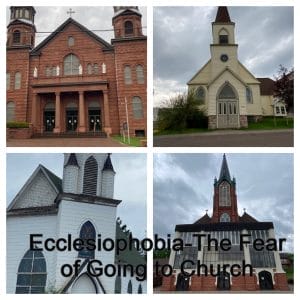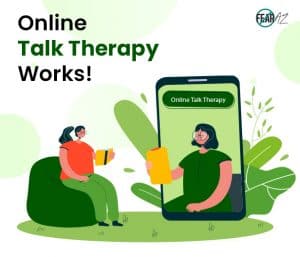Share This Article
Decoding Ecclesiophobia or The Fear of Going to Church
Does the sight of church buildings make you cringe?
Do you break out into a sweat at the mere mention of church or religious gatherings?
Do you find yourself making excuses to somehow skip Sunday service or even Christmas Mass?
Does this sound like you? If yes, you might be suffering from ecclesiophobia or the fear of going to church.
Ecclesiophobia Meaning
Ecclesiophobia refers to the extreme or irrational fear of churches. Ecclesiophobia is the fear of what negative events might happen if a person visits a church. Those with ecclesiophobia go out of their way to avoid churches, religious gatherings, or even looking at pictures of church buildings.
Even if you’re not religious, a fear of churches can negatively affect your life, because it makes it difficult to attend weddings, funerals, and other important ceremonies. Though this might seem like an irrational fear to you, know that you’re not alone.

Types of Ecclesiophobia
There are two types of ecclesiophobia or the fear of churches.
Fear of the Church Building
Some fear the ancient look and feel of church buildings. The architecture and Gothic cathedrals can be imposing and may invoke images of Victorian horror novels. Smaller chapels can also be claustrophobic and disorienting.
Fear of the Church
Some may fear the church as an institution and its religious beliefs and practices. True incidents of pedophiles in the clergy and the emotional abuse of the LGBT community can also invoke fear in people. What starts as a mild reluctance can develop into a full-blown phobia over time.
Causes of Ecclesiophobia
Though there are no specific known causes of ecclesiophobia, many in the mental health profession believe that environment and genetics play a huge role in developing this condition. We can inherit phobias and fears from family members or ancestors, especially if there is a heightened genetic predisposition for developing mental illness.
A traumatizing childhood event or a negative or fearful incident experienced in a church can instill an overbearing fear of going to church. Those who are afraid of authority can also develop this fear of churches as they are a symbol of supreme power throughout history.
Some may develop this anxiety because of the décor, architecture, and images of Jesus on the cross as it can activate fear of blood and death.
Ecclesiophobia Symptoms
Physical Symptoms
- Headaches
- Excessive sweating
- Trembling and dizziness
- Shortness of breath
- Numbness, dry mouth or hot flashes, chills
- Confusion, ringing in ears, rapid heartbeat
Mental/Emotional Symptoms
- Avoiding churches and religious ceremonies
- Feelings of dread, hopelessness, and disconnect
- Fear of being ridiculed
- Becoming socially withdrawn
- Fear of losing control or being possessed
- Anxiety about attending sermons, weddings, or funerals
- Mood swings, irritability, and anger
Ecclesiophobia Treatments
Many with ecclesiophobia are not even aware that such a phobia exists and move through life avoiding situations and circumstances that require them to face their fears. But it doesn’t have to be that way. It is possible to overcome a church phobia by seeking the right kind of professional therapy or even through self-help techniques.
Professional Help for Ecclesiophobia
Cognitive Behavioral Therapy (CBT)
In this technique, a therapist can help you overcome your church phobia by helping you amend your thoughts to achieve the desired behavior.
With CBT you can treat your ecclesiophobia by understanding why you think and behave the way you do with regards to your irrational fears. One of the main issues with ecclesiophobia is the lack of understanding in those who struggle with it. This contributes to an immediate subconscious reaction to fears, leading one to experience symptoms blindly.
CBT is a short-term and goal-oriented therapy that focuses on the present situation instead of probing the past. In this therapy, the problems are usually segregated into parts, such as feelings, thoughts, and actions. This can help you analyze your fears more deeply.
Along with understanding your church phobia, you can also expect to learn various other skills and relieve the anxiety caused by your condition.
Exposure Therapy
Exposure therapy is one of the common ways of treating ecclesiophobia. This therapy exposes you to your fears for a certain period, starting with the least triggering stimuli. Gradually, when you’re able to control your anxiety, you may be exposed to images and be asked to visualize your greatest triggers and situations. After you successfully master this stage, you’ll be exposed to real-life situations.
As you progress through the stimuli, your therapist will simultaneously teach you coping exercises like muscle relaxation methods or breathing techniques. These will help you lower your anxiety in a real-life situation.
However, before starting this therapy, your therapist must make sure to assess the severity of your symptoms so that no psychological or physical harm is caused during treatment.
Talk Therapy
Talk therapy includes counseling and can be very effective at treating fear of church or ecclesiophobia. This is a laid-back treatment that is physically non-intrusive and involves speaking to a trained therapist about your feelings, thoughts, and behavior.
Your therapist may recommend different coping skills to deal with your symptoms while uncovering the underlying reasons for your fear. Talk therapy is aimed at helping you recognize obstructive patterns in the way you think or act, and develop ways to alter them. It also gives you a safe place to speak to someone who won’t judge you.
Dialectical Behavior Therapy (DBT)
DBT is a therapy related to emotion regulation. Often used to treat people suffering from anxiety or borderline personality disorders, it can be very effective in treating ecclesiophobia, too. Sometimes conducted in groups, it usually lasts for around six months and can have either two people or more in a group.
This therapy provides you with a host of techniques, one of which is a half-smiling technique. In this, you’ll be required to think about your triggers and raise the corners of your mouth when fearful thoughts come to your mind. You will also be asked to refrain from entertaining any painful emotions evoked from your specific fear.
Coping ahead is another useful DBT skill. You’ll be asked to sit still in a place without distraction, close your eyes and think about different possible scenarios when you would face your specific fear. Then you strategize ways of dealing with it in the moment.
Self-Help: How Can You Help Yourself?
Mindfulness Meditation
This technique involves being aware of your thoughts and feelings by being focusing on the present. For this to be effective, you will have to clear your head of all the clutter and see to it that your body and mind are in sync together. It includes methods like focusing on your breath and influencing your emotions by processing the way your body feels and responds to certain thoughts and stimuli.
Exercise
Exercise is one of the most effective ways of dealing with anxiety disorders, including ecclesiophobia. Daily walks or jogs can help take your mind away from negative thoughts and help you focus on the present. Cardiovascular exercises can help relieve your stress by releasing those endorphins, the feel-good chemical in the brain. Aerobic exercise like biking, swimming, and skiing can help relieve some of the stress and pain related to ecclesiophobia. It can also condition your mind to better cope with stressful situations.
Reduce Caffeine
Consuming large amounts of caffeine and stimulants throughout the day can add to your anxiety. Caffeine essentially puts your body into a fight or flight mode which can make you experience more panic attacks and add to your ecclesiophobia symptoms. By being more mindful of your daily caffeine consumption you can reduce some of the symptoms associated with ecclesiophobia.
Coping with Ecclesiophobia
Coping with the fear of going to churches can be exhausting. Along with having to constantly explain to people the reason for your absence at weddings and ceremonies, you need to cope with symptoms too.
However, once you learn to deal with it, its grip on your life will fade away. Many people disregard ecclesiophobia and even claim that it doesn’t exist. But it is important to understand that for a person experiencing this fear, it is as real as it can get.
Invest in therapies and have faith that you’ll be able to overcome your fear of churches and lead a normal and carefree life. Remember that you have the power to control your fears. No fear is impossible to tackle. With the right efforts and dedication, you’ll be able to enjoy your next Christmas and attend weddings without having to make up excuses.




